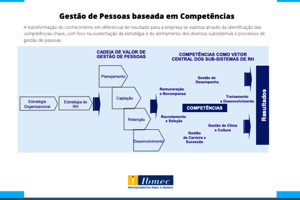Podcast
Questions and Answers
What is the role of teamwork in competency-based management?
What is the role of teamwork in competency-based management?
- Boosting individual performance based on tenure
- Rewarding employees solely on their specific abilities
- Enhancing employees' job titles
- Leveraging skills and knowledge to achieve organizational goals (correct)
How does competency-based management (CBM) differ from traditional methods?
How does competency-based management (CBM) differ from traditional methods?
- Relies on job titles and tenure for evaluation
- Does not provide customized training programs
- Rewards employees based on personal preferences
- Focuses on employees' strengths and abilities for evaluation (correct)
What is one key aspect of identifying competencies in CBM?
What is one key aspect of identifying competencies in CBM?
- Understanding each team member's strengths and weaknesses (correct)
- Assessing employees only based on job titles
- Neglecting the need for customized training programs
- Relying on general assumptions about team members
Which statement best describes the relationship between teamwork and individual performance in CBM?
Which statement best describes the relationship between teamwork and individual performance in CBM?
How does CBM encourage a culture of lifelong learning?
How does CBM encourage a culture of lifelong learning?
What is one benefit of forming strong teams through competency-based management?
What is one benefit of forming strong teams through competency-based management?
What is a key aspect of enhancing collaboration in teams according to the text?
What is a key aspect of enhancing collaboration in teams according to the text?
Why is identifying competencies considered a challenge in competency-based management?
Why is identifying competencies considered a challenge in competency-based management?
What is a requirement for competency-based management according to the text?
What is a requirement for competency-based management according to the text?
How does competency-based management encourage continuous improvement?
How does competency-based management encourage continuous improvement?
Flashcards are hidden until you start studying
Study Notes
Competency-Based Management: Emphasizing Teamwork
Competency-based management (CBM) is an approach to organizational development that focuses on harnessing employees' strengths and areas of expertise to boost performance. Unlike traditional management methods that primarily rely on job titles and tenure, CBM evaluates and rewards individuals based on their specific skills and abilities. In this article, we'll explore the role of teamwork within competency-based management.
What is Competency-Based Management?
CBM's primary objective is to foster a work environment where employees are encouraged to learn and grow continuously, resulting in improved team performance. CBM emphasizes:
- Identifying and evaluating employees' core competencies through various assessment methods
- Developing customized training programs and career paths based on competency needs
- Recognizing and rewarding employees based on their skills and progress
- Encouraging a culture of lifelong learning and improvement
Teamwork in Competency-Based Management
Effective teamwork is a fundamental component of competency-based management. CBM leverages employees' skills, knowledge, and collaborative strengths to achieve organizational goals more effectively.
Identifying Competencies
By identifying essential competencies, CBM can understand the strengths and weaknesses of each team member. This information empowers leaders to create teams with complementary skill sets to enhance productivity and reduce vulnerabilities.
Building Strong Teams
CBM encourages the formation of strong teams by uniting individuals with compatible competencies, fostering a cohesive unit. This approach has been shown to increase employee satisfaction, reduce turnover, and drive overall productivity within organizations.
Enhancing Collaboration
When team members understand each other's strengths and competencies, they can collaborate more effectively. This form of collaboration often leads to the creation of innovative solutions and the development of new skills.
Embracing Diversity
CBM fosters a culture that embraces diversity by recognizing and valuing individual differences. By leveraging diverse competencies, teams can make better decisions, innovate more effectively, and better serve a diverse customer base.
Continuous Improvement
CBM emphasizes continuous improvement, a key component of teamwork. As team members gain new competencies and skills, they can work together to improve existing processes and procedures, driving efficiency and enhancing outcomes.
Challenges of CBM in Teamwork
While competency-based management offers a wealth of benefits, it also presents some challenges.
Identifying Competencies
Identifying core competencies can be challenging, as not all skills are easily measurable. Additionally, some competencies may be broader in scope, such as "entrepreneurial thinking" or "creativity," which can be challenging to assess accurately.
Upskilling and Reskilling
CBM often requires employees to upskill or reskill to meet changing competency needs, which can be time-consuming and resource-intensive. However, these efforts are critical to ensuring that employees remain engaged in their work and that organizations remain competitive.
Cultural Shift
CBM requires a significant cultural shift within organizations. To be successful, employees must embrace lifelong learning, and leaders must be open to evaluating employees based on their core competencies rather than traditional metrics, such as tenure or job title.
Conclusion
Competency-based management is an evolving approach to organizational development that emphasizes teamwork and continuous improvement. By identifying and evaluating core competencies, organizations can create teams with complementary skill sets, foster collaboration, and encourage continuous learning. However, CBM faces several challenges, such as identifying competencies and encouraging a cultural shift. Despite these challenges, CBM offers a wealth of benefits, driving employee satisfaction, productivity, and innovation. Embracing this approach can lead to meaningful improvements in organizational performance and a more engaged and skilled workforce.
Studying That Suits You
Use AI to generate personalized quizzes and flashcards to suit your learning preferences.




